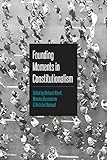Founding moments in constitutionalism / Edited by Richard Albert, Menaka Guruswamy, Nishchal Basnyat.
Publisher: Chicago : Hart Publishing, an imprint of Bloomsbury Publishing, 2019Description: 257 pages 22 cmContent type:- text
- volume
- 9781509952090
- 342 23
| Item type | Current library | Shelving location | Call number | Materials specified | Status | Notes | Barcode | |
|---|---|---|---|---|---|---|---|---|
 BOOKs
BOOKs
|
National Law School | General Stacks | 342 ALB (Browse shelf(Opens below)) | PB | Available | Recommended by Prof. Kamala Sankaran | 39591 |
Includes bibliographical references and index.
Introduction: Mapping the Founding:
Richard Albert and Menaka Guruswamy;
1. Between Fact and Norm: Narrative and the Constitutionalisation of Founding Moments
Ming-Sung Kuo;
2. The Role of Courts in Advancing Constitutional Moments: Constitutionalising the Constitution in Singapore and Hong Kong;
Swati Jhaveri;
3. Foundation and Revolution: Hannah Arendt and the Problem of Legitimacy and Stability in Constitutional Consolidation;
Mel A Topf;
4. I am Not Your (Founding) Father;
Mikolaj Barczentewicz;
5. 'And Then They Begin to Look after the History of Their Founders': (Re)configurations of the Founding in the Early Republic;
Simon Gilhooley;
6. Under the Shadow of the Constitutional Revolution? Revisiting Israel's Founding Moments;
Yair Sagy;
7. Path-Dependency in Soviet and Russian Constitution-Making;
Eugene D Mazo;
8. 'Founding Moments' in Latin America? Th e Brazilian and Chilean Constitutional Histories and the Rise of the Forgotten People;
Juliano Zaiden Benvindo;
9. We the Taiwanese People: A Constitution with Two Antagonistic Constitutional Identities;
Chien-Chih Lin;
10. What's in a Founding? Founding Moments and Pakistan's 'Permanent Constitution' of 1973;
Maryam S Khan;
11. A Founding Moment in Iraq: A Gender Perspective;
Noga Efrati;
Conclusion: Rethinking Founding Moments;
Nishchal Basnyat;
"Conventionally, founding moments are landmark events that break ties with the ancient regime and lay the foundation for the establishment of new constitutional order. They are often depicted as occurring radically, and are best exemplified by revolution. Founding moments shape national law, influence surrounding countries, establish future power structures and reinforce political institutions established by the constitution. This edited collection brings together leading scholars to consider how much we know about the idea of a founding moment. Divided into three main parts, the first part on 'theory' explores founding moments as a concept. In approaching the phenomenon in a theoretical way, this part establishes some basic ideas that can lead to a general understanding of what exactly founding moments are. The second part focuses on 'history', the chapters take a distinctly historical approach to the idea of a founding moment, whether by closely reconsidering a founding moment in a regime or by engaging in a historical archival research. The third part, on 'application', looks at the founding moments of specific states. Many of these are cases which differ from the conventional model of founding moments"-- Provided by publisher.
There are no comments on this title.
